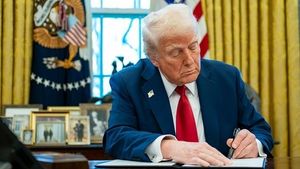Former Brazilian President Jair Bolsonaro, a figure who has rarely been far from the headlines, now faces a new and unexpected challenge: a diagnosis of skin cancer. The news, announced on Wednesday by his doctor Claudio Birolini, comes just days after Bolsonaro was convicted of plotting a coup to overturn the results of Brazil’s 2022 presidential election—a conviction that has left him under house arrest and sentenced to more than 27 years in prison.
According to multiple reports, including those from Bloomberg, CNN Brasil, and DW, Bolsonaro, age 70, underwent a procedure on Sunday, September 14, 2025, to remove eight skin lesions. Biopsies revealed that two of these lesions—one on his chest and another on his arm—tested positive for squamous cell carcinoma, a type of skin cancer that, while not the most aggressive, is still a cause for concern. Dr. Birolini told reporters, “The tests showed that two of the lesions were an early type of skin cancer.”
Doctors described Bolsonaro’s cancer as “in situ,” meaning the abnormal cells remain localized and show no signs of having spread. As reported by CNN Brasil, Dr. Birolini explained, “Two of the lesions tested positive for squamous cell carcinoma, which is neither the kindest nor the most aggressive, but it is still a skin cancer.” The diagnosis will require ongoing clinical monitoring and periodic reevaluation to ensure the removals were complete and that no new lesions appear. Medical staff at DF Star Hospital in Brasilia, where Bolsonaro received treatment, emphasized the importance of vigilance in the coming months.
The timing of the diagnosis adds another layer to Bolsonaro’s already complicated legal and personal situation. Less than a week before the news broke, Bolsonaro was convicted of plotting a coup d’état—a charge prosecutors say included plans to potentially assassinate current President Luiz Inácio Lula da Silva. The former president was sentenced to more than 27 years in prison, though he remains under house arrest and is expected to appeal the verdict. The court’s decision followed months of legal wrangling and public debate, with Bolsonaro’s supporters and detractors fiercely divided over the proceedings.
Bolsonaro’s health woes have not been limited to his recent cancer diagnosis. On Tuesday, September 16, just two days after his skin procedure, he was admitted to DF Star Hospital for a separate set of symptoms: vomiting, dizziness, low blood pressure, and pre-syncope—a sensation of impending fainting. These symptoms prompted an overnight stay, but he was discharged on Wednesday and continues to be monitored by his medical team. According to DW, these recent health problems are not entirely new. Bolsonaro has previously been hospitalized for pain related to a wound sustained when he was stabbed during a campaign rally seven years ago, a traumatic event that has cast a long shadow over his political and personal life.
Despite the gravity of the situation, Bolsonaro’s family has sought to project confidence. His eldest son, Senator Flávio Bolsonaro, took to social media to reassure supporters. On Wednesday, he wrote, “My father has already fought tougher battles and won. This one won’t be any different.” The message, shared widely on X (formerly Twitter), was echoed by Bolsonaro’s political allies, who have rallied around the former president in the wake of both his legal and health setbacks.
Bolsonaro’s legal team has been quick to challenge the court’s verdict, insisting on his innocence and vowing to appeal the conviction. The former president has denied any wrongdoing, maintaining that the charges against him are politically motivated. This sentiment has found a sympathetic ear in former U.S. President Donald Trump, who called Bolsonaro’s trial a “witch hunt” and cited it as part of his rationale for imposing 50% tariffs on Brazilian goods—a move that has further complicated relations between the two countries. Trump’s intervention has injected an additional layer of international intrigue into an already fraught Brazilian political landscape.
The broader context of Bolsonaro’s predicament cannot be ignored. Since losing the 2022 presidential election to Lula da Silva, Bolsonaro has remained a deeply polarizing figure in Brazilian politics. His supporters view him as a bulwark against what they see as leftist overreach, while his critics accuse him of undermining democratic institutions and fomenting unrest. The coup conviction, which stems from allegations that Bolsonaro and his allies plotted to overturn the election results, has only deepened these divisions. The court’s sentence—27 years in prison—is among the harshest ever handed down to a former Brazilian leader, signaling the seriousness with which the judiciary views the charges.
Bolsonaro’s house arrest, which began in early August after he allegedly violated precautionary measures imposed for his trial, has kept him largely out of the public eye. Yet, the former president’s health crisis has thrust him back into the spotlight, raising questions about how his medical condition might affect the ongoing legal proceedings. According to his doctors, Bolsonaro will need regular check-ups to monitor his recovery and ensure that no further cancerous lesions develop. The “in situ” nature of his cancer offers some reassurance, but as any oncologist will tell you, vigilance is key.
For many Brazilians, the news of Bolsonaro’s cancer diagnosis is yet another twist in a saga that has gripped the nation for years. His rise from a little-known congressman to the presidency, his combative style, and his dramatic fall from power have all contributed to an almost mythic public persona. Now, as he faces the dual challenges of serious illness and a lengthy prison sentence, the question on everyone’s mind is: what comes next?
The intersection of health and politics is nothing new in Brazil—or, indeed, anywhere else. But rarely has it played out in such dramatic fashion. As the country watches and waits, Bolsonaro’s fate remains uncertain, shaped as much by the unpredictable course of his illness as by the slow grind of the legal system. Allies and adversaries alike are left to wonder whether the former president’s storied resilience will see him through yet another crisis—or whether this latest battle will prove to be the most daunting of all.
For now, Bolsonaro’s future hangs in the balance, a testament to the unpredictable nature of both politics and life itself.





